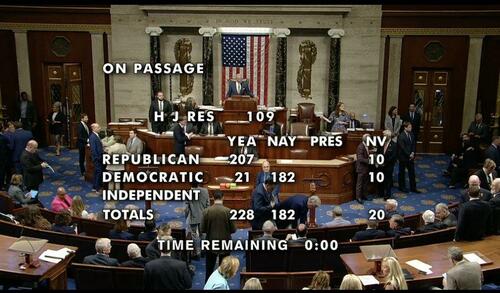Authored by Tom Mitchelhill via CoinTelegraoph.com,
The United States House of Representatives has voted to pass a bill that overturns controversial Securities and Exchange Commission guidance preventing banks from owning crypto.
On May 8, the House voted to pass a bipartisan bill dubbed H.J. Res 109 which overturns the SEC’s Special Accounting Bulletin (SAB 121) that requires banks to hold their customers’ crypto assets on their balance sheets - which is not the case for traditional assets such as securities.
Republican Congressman Mike Flood - the lawmaker who introduced the resolution - said SAB 121 was unfair for banks looking to custody crypto, as custodial assets are “always considered off-balance sheet."
"Gary Gensler, in his jihad against digital assets, used what is supposed to be mundane staff accounting guidance to essentially freeze out large publicly traded banks from taking custody of digital assets," said Rep. Flood (R-Neb.) in a Wednesday interview with CoinDesk.
And the SEC didn't consult with the banking regulators about it, Flood pointed out, arguing that Gensler "doesn't have any business in the banking world."
Notably, 21 Democrats voted in favor of the bill - which combined with the unanimous 207 votes from Republicans - saw the bill pass 228 votes to 182.
Source: Caitlin Long/X
"By overturning SAB 121, the bipartisan resolution ensures consumers are protected by removing roadblocks that prevent highly regulated financial institutions and firms from acting as custodians of digital assets," wrote the House Financial Services Committee (HSFC) in a May 8 statement.
“Staff Accounting Bulletin 121 is one of the most glaring examples of the regulatory overreach that has defined Gary Gensler’s tenure at the SEC,” said HSFC Chairman Patrick McHenry.
Introduced by the SEC in March 2022, SAB 121 outlines the regulator’s accounting guidelines for institutions looking to custody crypto assets. Notably, SAB 121 virtually prevents banks from custodying crypto assets on behalf of clients.
U.S. lawmakers including SEC Commissioner Hester Peirce have argued SAB 121 jeopardizes the willingness of regulated banks to act as crypto custodians and treats crypto holdings differently than other assets.
Despite the bill being passed through the House of Representatives, President Joe Biden stated he will veto the new bill.
"SAB 121 was issued in response to demonstrated technological, legal, and regulatory risks that have caused substantial losses to consumers," Biden said in a Wednesday statement, saying he "strongly opposes" disrupting the SEC's work on this.
In a May 8 statement, the White House said it “strongly opposes” members of the House of Representatives looking to overturn SAB 121, claiming it would disrupt the SEC’s efforts “to protect investors in crypto-asset markets and to safeguard the broader financial system.”
"Limiting the SEC’s ability to maintain a comprehensive and effective financial regulatory framework for crypto-assets would introduce substantial financial instability and market uncertainty."
Source: White House
No lesser mortal than key House Democrat Rep. Maxine Waters thought Flood's resolution went too far.
"This bill takes a sledgehammer to fix an issue that may merely need a scalpel, and it does so because my colleagues on the other side of the aisle are not only interested in doing the bidding of special interest groups, they are also interested in attacking and undermining the SEC in every possible way," said Rep. Maxine Waters (D-Calif.), the ranking Democrat on McHenry's committee.
As CoinDesk reports, when an agency rule is reversed under the Congressional Review Act, it's not only erased, but anything similar is forever blocked from future implementation.
Waters argued that SAB 121 – apart from the controversial custody component – also provided guidance on crypto disclosures that are necessary and would be threatened if Congress overturns the policy, and Biden echoed the concern about policies that would be blocked.
Authored by Tom Mitchelhill via CoinTelegraoph.com,
The United States House of Representatives has voted to pass a bill that overturns controversial Securities and Exchange Commission guidance preventing banks from owning crypto.
On May 8, the House voted to pass a bipartisan bill dubbed H.J. Res 109 which overturns the SEC’s Special Accounting Bulletin (SAB 121) that requires banks to hold their customers’ crypto assets on their balance sheets - which is not the case for traditional assets such as securities.
Republican Congressman Mike Flood - the lawmaker who introduced the resolution - said SAB 121 was unfair for banks looking to custody crypto, as custodial assets are “always considered off-balance sheet."
"Gary Gensler, in his jihad against digital assets, used what is supposed to be mundane staff accounting guidance to essentially freeze out large publicly traded banks from taking custody of digital assets," said Rep. Flood (R-Neb.) in a Wednesday interview with CoinDesk.
And the SEC didn't consult with the banking regulators about it, Flood pointed out, arguing that Gensler "doesn't have any business in the banking world."
Notably, 21 Democrats voted in favor of the bill - which combined with the unanimous 207 votes from Republicans - saw the bill pass 228 votes to 182.
Source: Caitlin Long/X
"By overturning SAB 121, the bipartisan resolution ensures consumers are protected by removing roadblocks that prevent highly regulated financial institutions and firms from acting as custodians of digital assets," wrote the House Financial Services Committee (HSFC) in a May 8 statement.
“Staff Accounting Bulletin 121 is one of the most glaring examples of the regulatory overreach that has defined Gary Gensler’s tenure at the SEC,” said HSFC Chairman Patrick McHenry.
Introduced by the SEC in March 2022, SAB 121 outlines the regulator’s accounting guidelines for institutions looking to custody crypto assets. Notably, SAB 121 virtually prevents banks from custodying crypto assets on behalf of clients.
U.S. lawmakers including SEC Commissioner Hester Peirce have argued SAB 121 jeopardizes the willingness of regulated banks to act as crypto custodians and treats crypto holdings differently than other assets.
Despite the bill being passed through the House of Representatives, President Joe Biden stated he will veto the new bill.
"SAB 121 was issued in response to demonstrated technological, legal, and regulatory risks that have caused substantial losses to consumers," Biden said in a Wednesday statement, saying he "strongly opposes" disrupting the SEC's work on this.
In a May 8 statement, the White House said it “strongly opposes” members of the House of Representatives looking to overturn SAB 121, claiming it would disrupt the SEC’s efforts “to protect investors in crypto-asset markets and to safeguard the broader financial system.”
"Limiting the SEC’s ability to maintain a comprehensive and effective financial regulatory framework for crypto-assets would introduce substantial financial instability and market uncertainty."
Source: White House
No lesser mortal than key House Democrat Rep. Maxine Waters thought Flood's resolution went too far.
"This bill takes a sledgehammer to fix an issue that may merely need a scalpel, and it does so because my colleagues on the other side of the aisle are not only interested in doing the bidding of special interest groups, they are also interested in attacking and undermining the SEC in every possible way," said Rep. Maxine Waters (D-Calif.), the ranking Democrat on McHenry's committee.
As CoinDesk reports, when an agency rule is reversed under the Congressional Review Act, it's not only erased, but anything similar is forever blocked from future implementation.
Waters argued that SAB 121 – apart from the controversial custody component – also provided guidance on crypto disclosures that are necessary and would be threatened if Congress overturns the policy, and Biden echoed the concern about policies that would be blocked.



